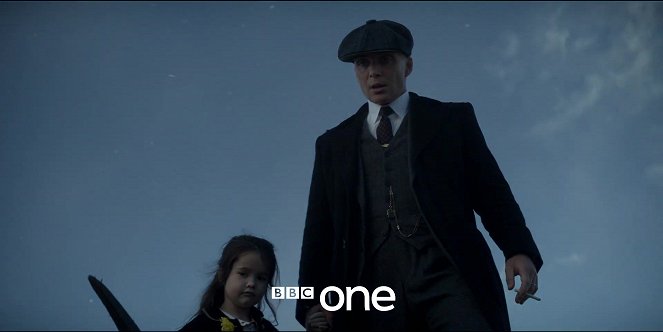Alkotók:
Steven KnightSzereplők:
Cillian Murphy, Sam Neill, Helen McCrory, Iddo Goldberg, Annabelle Wallis, Andy Nyman, Harry Kirton, Paul Anderson, Joe Cole, Natasha O'Keeffe (több)Évad(6) / Epizódok(36)
Tartalmak(1)
1919. Anglia, Birmingham. A hirhedt bandavezér, Tommy Shelby mindent feláldoz azért, hogy előrébb jusson. (Netflix)
Felhasználói recenzió gudaulin ehhez a sorozathoz (1)
Birmingham bandája (2013)
My first encounter with Peaky Blinders was charming. I am a big fan of 19th-century industrial architecture, those old railway station buildings, and classic factories with their unmistakable appearance. In this series, I had the opportunity to see it come alive and fully functional. Flames were bursting, smoke was billowing, and workers were running around, and I had just been transported back in time a hundred years. The second plus was the luxurious cast led by the charismatic Cillian Murphy. My two stars are specifically for the above-mentioned. The rest of it started to get on my nerves in a short period of time, despite my high expectations based on the high ratings and praises on FilmBooster. I will start with the highly acclaimed musical aspect of the project. Let me make it clear, I consider the soundtrack great and I would gladly listen to it. Unfortunately, it fits the series about as well as a medieval Cathedral surrounded by a group of 20th-century functionalist buildings. It does not fit the stylish retro at all, the ideal would be a combination with a modern dynamic thriller. The musical component does not fit not only in terms of expression but also in terms of tempo. Secondly, in the comments, the exceptional nature of the work is often emphasized from a content perspective. Personally, I feel that the screenwriters followed instructions that were once written by Umberto Eco in his collection of essays on skeptics about how a well-selling pop culture piece made for maximizing profit should look. It is simply composed of ingredients that are easily understandable to the widest range of viewers and, moreover, made in such a cool style, like slow-motion shots, detailed shots of grim faces full of emotions, i.e., those proven and somewhat cheap tools, which the recently watched parody series Darkplace superbly and rightfully makes fun of. I don't blame Peaky Blinders for being cool. Both seasons of the American series Fargo are cool too, and the British series Luther is spot-on, and I loved them. However, what I cannot forgive Peaky Blinders for is the romanticized treatment, sentimentality, and moral relativization. It is often compared to the American series Boardwalk Empire. However, that series acts as the complete opposite of Peaky Blinders. It is analytical and, in my opinion, precisely captures the history of organized crime in the USA. It portrays its characters as charismatic and capable individuals in their own way, but it does not allow the viewer to form an emotional bond with them. On the contrary, it depicts them as incapable of building a family foundation, as megalomaniacs and human monsters. It removes any veneer from them. Peaky Blinders, on the other hand, purposefully creates a bond between the viewer and its protagonists, forcing you to root for them and sympathize with them. The American series Boardwalk Empire may not portray the guardians of order and political elites in a flattering light, but in Peaky Blinders, the members of the criminal underworld appear morally superior and more sympathetic side of the conflict. And finally, if Peaky Blinders is described as a cruel, uncompromising, and bloody spectacle, then I have the exact opposite impression of the first season. The motive of the relationship between the main character and the undercover policewoman feels like it came from a Mexican telenovela, and the character of the amoral police commissioner had to have been dug up from Victor Hugo's literary legacy. Of course, I cannot rule out that everything will turn for the better in the second season, but the final episode of the first season left me with a truly depressing impression. I have never seen a more theatrical scene of two criminal gangs clashing. Overall impression: 45% mainly for the truly successful atmosphere of the dirty working-class district of industrial England in the first half of the 20th century.
()
(kevesebbet)
(több)


